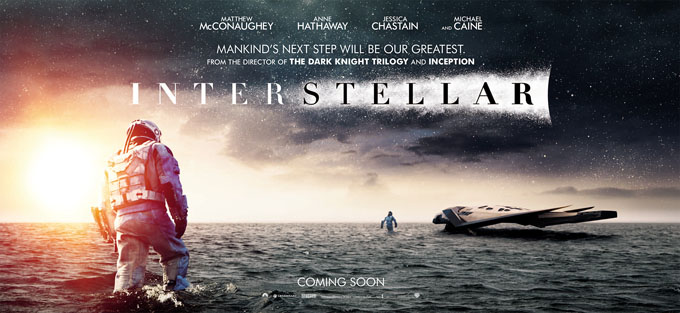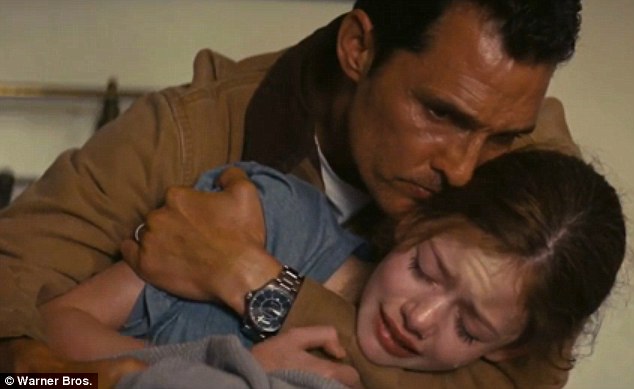This isn’t the kind of review where I’m careful not to spoil the movie. It’s the kind of review where I do spoil the movie. It’s been out for weeks. Get over it.
With INTERSTELLAR, writer/director/producer Christopher Nolan makes a compelling case that his greatest strength as a filmmaker is the ability to make exposition palatable. His last foray into original material, 2010’s INCEPTION, centered around a complicated heist that required dense passages of exposition in order for the viewer to parse the dream-within-a-dream-within-a-dream logic. The payoff for all that setup was spectacular, and the setup itself was action-filled and spent a lot of time on the familiar and pleasing “getting the team together” developments.
INTERSTELLAR, a film that surpasses the 148-minute length of INCEPTION by 21 minutes, doesn’t even have time for the team-building. Almost the entire first hour consists of people in a room talking to each other. Or talking in blunt, on-the-nose sentences that will assuredly be recalled neatly later (since Nolan’s second-greatest strength is his ability to construct clever polished puzzles out of his films). That my attention stayed somewhere between intrigued and semi-riveted despite an almost total lack of action during the first half of the film speaks to Nolan’s talent for exposition-dumping. He’s a filmmaker of concepts and tricks, and as his thirst for bigger and bigger concepts and tricks grows, so to does the necessity of including more and more exposition. It’s no mean feat to educate a viewer on black holes, worm holes, relativity, why the world is ending, how we’re going to save the world, why people are good, and why people are assholes in a way that doesn’t feel outwardly pedantic. Or, at least, not annoyingly pedantic.
At times though, this is a dubious talent. Because Nolan is careful to parcel out expository information to coincide with the dramatic moments in the story (maintaining our interest), the characters don’t seem to exist when they’re off the screen. This makes characters seem like mere engines of plot (and exposition) instead of anything resembling human beings. It also makes them seem a little… moronic.
An example: our hero, Coop Cooper (Matthew McConaughey) is a gifted engineer and pilot. At one point, he’s described as the most qualified person on the planet to fly a spaceship through a wormhole to another galaxy so he can save the entire human race. He is brains, brawn, and guts personified. Except he’s either a moron or he slept through the part of his life where NASA explained the mission to him. Because it’s not until they’ve slipped the surly bonds of Earth’s gravity that one of his teammates, Amelia Brand (Anne Hathaway), explains to him where they’re going. Then, as they’re approaching the wormhole, another teammate, Romilly (David Gyasi), has to explain to him what a wormhole is using a pen and scratch paper. Yet despite these obvious gaps in his knowledge, Coop has no issues piloting the craft. So he was clearly trained for what I would imagine to be many arduous months so he could fly the ship. Since the fate of the entire human race depends on this mission. But he seems a bit foggy on where they’re going and how they’re actually going to get there.
Of course, Nolan puts this expository information at these junctures to keep the audience engaged. Since most of the movie up to this point has just been people talking about stuff and things, a scene where some NASA scientist explains the entire mission in a sterile turd of exposition scene, maybe with a helpful PowerPoint, wouldn’t work. And besides, Romilly and Amelia aren’t really explaining these essential pieces of information to Coop, they’re explaining them to the audience. Except that they’re explaining them to Coop.
Moments like this, where Character A tells Character B something that Character B would know already unless they spent all their time off-screen unconscious in a cave, privilege the plot over the characters. That not surprising–outside of Coop’s journey, there isn’t much character development to be found here.
Most characters have a single motivation that reveals an element of humanity. Each reveal is also packaged as a surprise twist. The NASA mastermind, Dr. Brand (Michael Caine), represents the rational, and limited, mindset of a scientist and has actually given up on Earth’s survival, putting all the human race’s chips in the Colony-Starting Basket. His daughter, Amelia Brand, represents the triumph of love and actually wants to go a certain planet because the dude she loves was sent there. Coop’s daughter, Murph Cooper (Jessica Chastain), is pretty much the pinnacle of the human race. She represents the ingenuity of mankind, along with love and reason, but it’s her capacity for faith that leads to civilization’s salvation. Not religious faith, but a faith in humanity (and her father). On the other hand, the film’s antagonist, Dr. Mann (Matt Damon), represents the base selfishness of man’s survival instinct. At the end of the second act, when all appears to be lost, the real enemy to mankind is revealed to be Mann. Get it? Har har.
In case you haven’t gathered, this isn’t a subtle film. Too often characters are turned into conceptual mouthpieces spouting well-prepared statements and anecdotes about survival, science, love, and humanity. Sometimes they let loose howlers like this from Amelia Brand, after the debacle on Planet Cowabunga Tidal Wave: “Coop, I’m sorry. I screwed up. But you knew about relativity!” I like to imagine that someone explained it to him using a crayons and a sock puppet Einstein, perhaps just after showing him how wormholes work with the scratch paper.
It’s ironic that Matthew McConaughey’s performance is one of the two things that holds the whole knotted mass of INTERSTELLAR together. Because while the script inadvertently makes him out to be a dunce, McConaughey plays Coop as brilliant, brave, and vulnerable. He’s real, he’s alive, he sweats and breathes. He’s just the man you’d back to save the human race. And he’s so damn handsome in his Carhartt jacket.
The other thing that holds INTERSTELLAR together is the fact that it’s a knotted mass. It’s a Nolan puzzle box, carefully constructed, that gives the audience little dopamine squirts with every connection and reveal they figure out. Or are fed. We are rats in his maze, following the bends in the story in the hopes that we’ll be rewarded with the Cheese of Understanding. There are no dead ends, no meandering asides. Keep your arms and legs inside the ride at all times. Because we’re dealing with time travel here, all 1st and 2nd act mysteries are accounted for through Coop’s intervention and epiphanies.
Who are “they”? Why, they’re super-advanced us! What the hell was going on with Amelia Brand’s inter-dimensional handshake? It was Coop! How did the ghost tell Murph to tell Coop he needed to stay? Coop again, knocking encyclopedias to the floor!
Perhaps I’m generalizing too much in saying that Nolan solves all the mysteries he creates. But he is a fastidious filmmaker, controlled to the point that while the film is ambitious and epic, it’s not sprawling. It’s not loose. Although we get a cathartic ending, it doesn’t feel joyous. It just feels like the end of satisfying ride. A long, twisty, enjoyable ride punctuated by moments of awe, but not wonder. Because plot and concept are the coin of the realm here, and characters lack interiority while seeming to not exist when off-screen, it’s like Nolan erected an impressive skyscraper that’s devoid of all life except a single meteoric McConaughey streaking through its corridors.
I appreciate INTERSTELLAR for its scope and dedication. I’m happy that it’s an original film by a filmmaker who has enough free rein (despite a $165 million budget) to explore challenging ideas that compel him. I enjoyed thinking about the thrills of exploration and the mindfuckery of relativity time squeezing and the practical loveliness of problem-solving through engineering and astrophysics. But I don’t love the film. It lacks the organic weirdness of life. Real life, not concepts or plot points or puzzles. In INTERSTELLAR, love is something to be defined and catalogued for quick recall at the relevant moment of the story. It’s a film full of sleight-of-hand but not magic. Ultimately, it feels a little empty–aiming at truth, but so calculated that it misses the mark.



